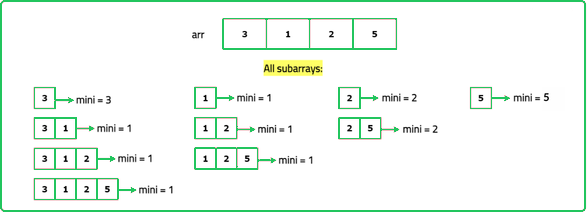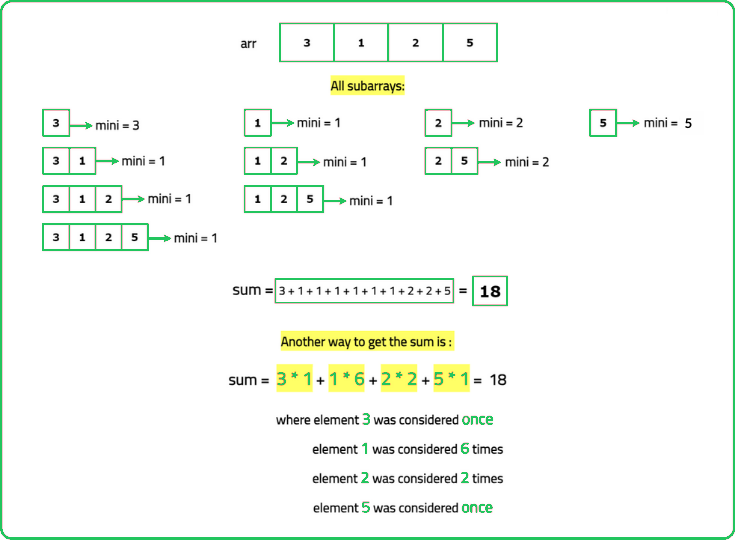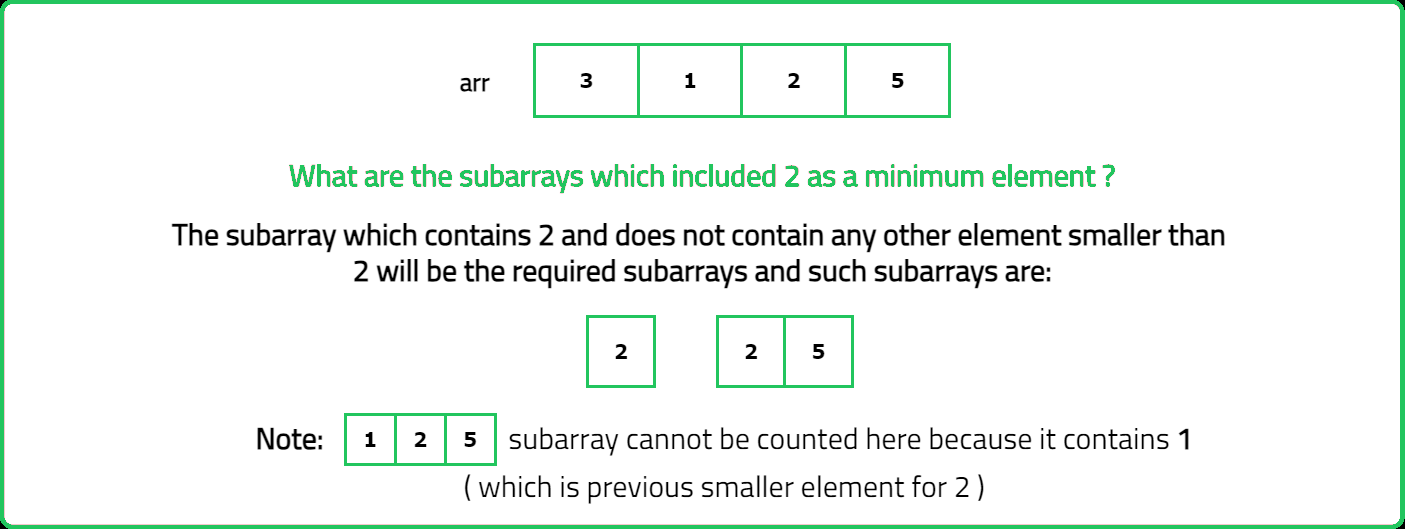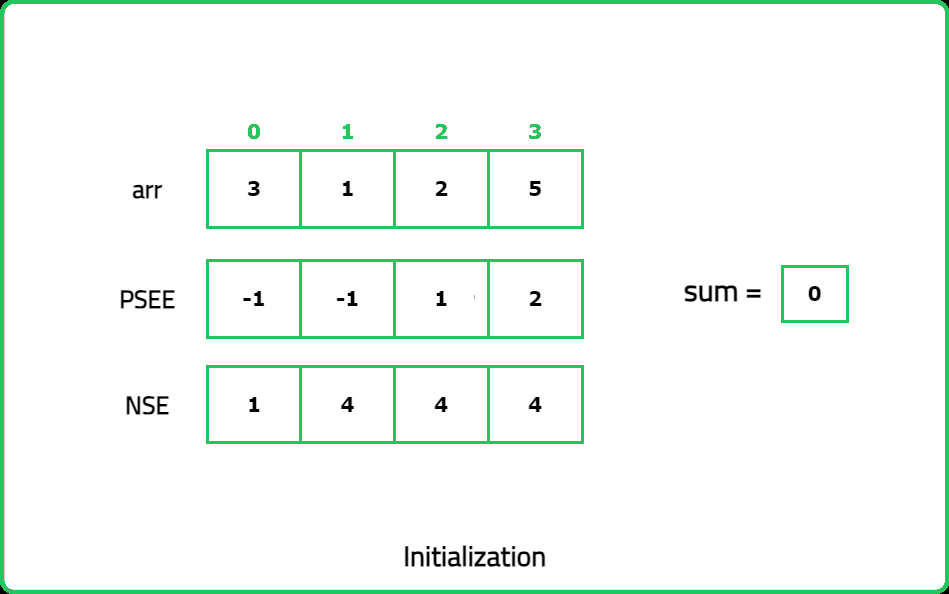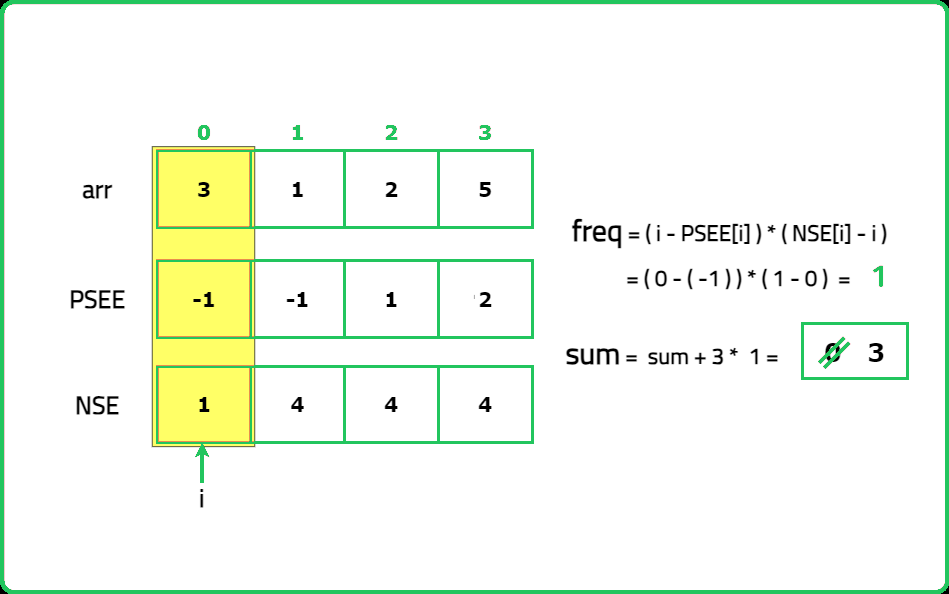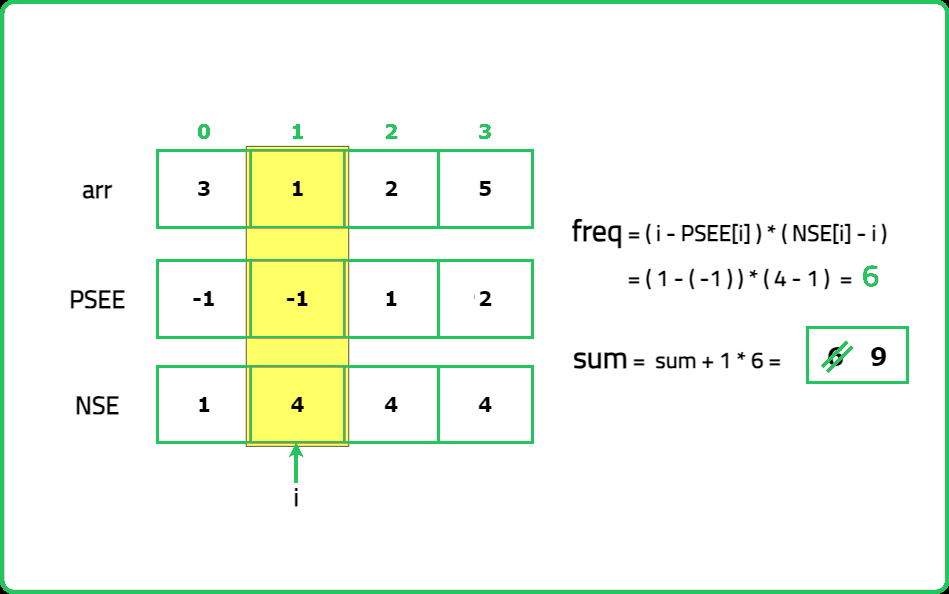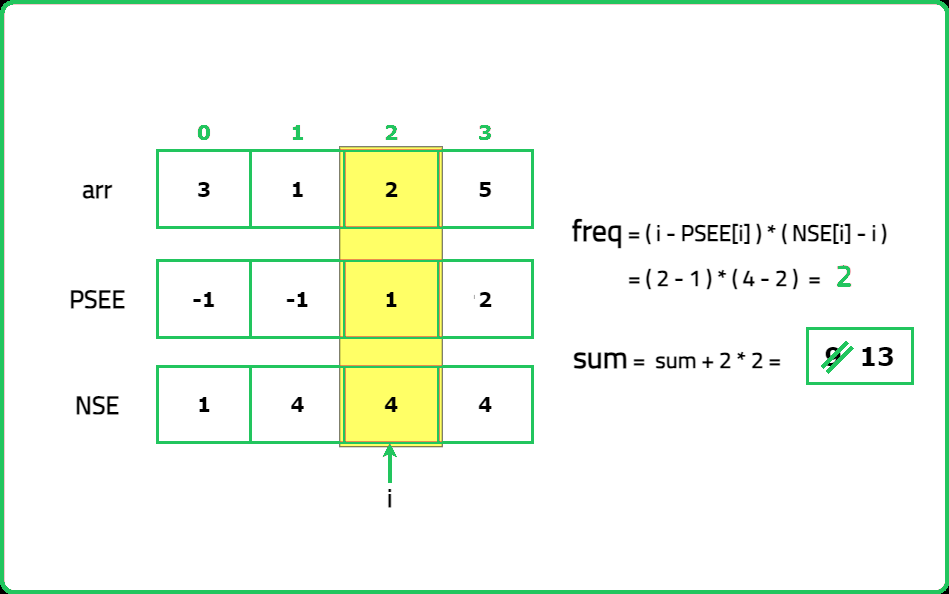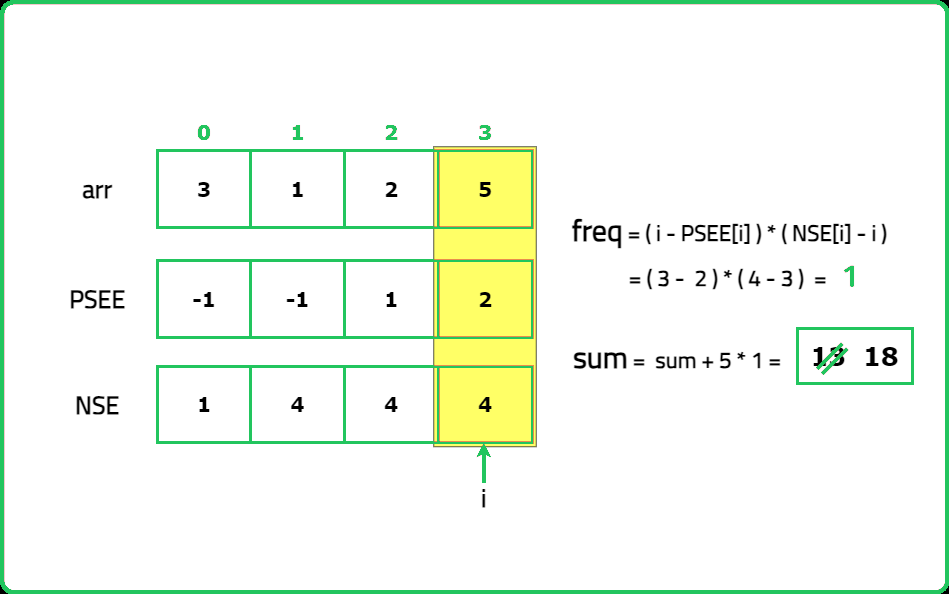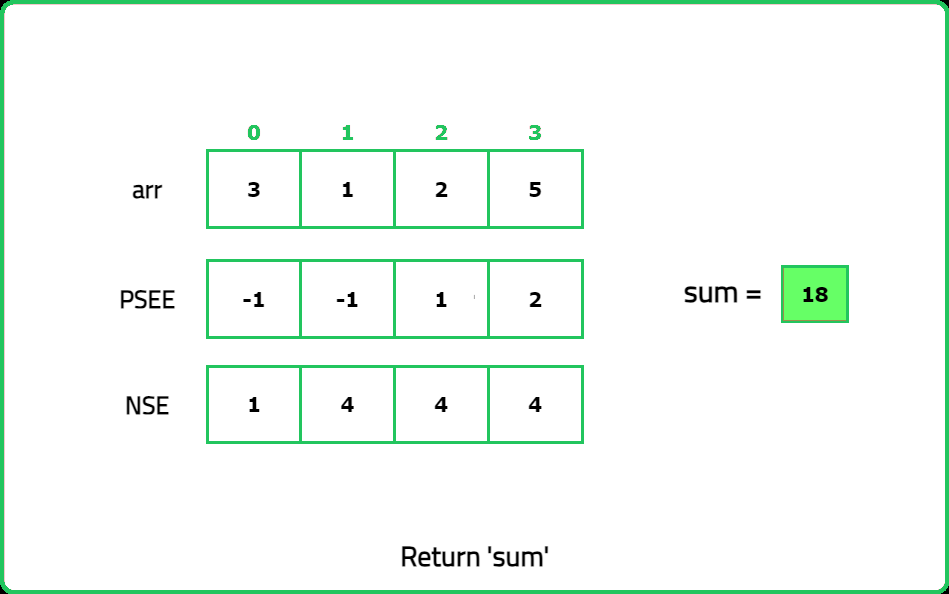123456789101112131415161718192021222324252627282930313233343536373839404142434445464748495051525354555657585960616263646566676869707172737475767778798081828384858687888990919293949596979899100101102103104105106107108109110111112113114115116117118119120121122123124125126127128129130131132133134135136137138139140141
#include <bits/stdc++.h>
using namespace std;
class Solution {
private:
/* Function to find the indices of
next smaller elements */
vector<int> findNSE(vector<int> &arr) {
// Size of array
int n = arr.size();
// To store the answer
vector<int> ans(n);
// Stack
stack<int> st;
// Start traversing from the back
for(int i = n - 1; i >= 0; i--) {
// Get the current element
int currEle = arr[i];
/* Pop the elements in the stack until
the stack is not empty and the top
element is not the smaller element */
while(!st.empty() && arr[st.top()] >= arr[i]){
st.pop();
}
// Update the answer
ans[i] = !st.empty() ? st.top() : n;
/* Push the index of current
element in the stack */
st.push(i);
}
// Return the answer
return ans;
}
/* Function to find the indices of
previous smaller or equal elements */
vector<int> findPSEE(vector<int> &arr) {
// Size of array
int n = arr.size();
// To store the answer
vector<int> ans(n);
// Stack
stack<int> st;
// Traverse on the array
for(int i=0; i < n; i++) {
// Get the current element
int currEle = arr[i];
/* Pop the elements in the stack until
the stack is not empty and the top
elements are greater than the current element */
while(!st.empty() && arr[st.top()] > arr[i]){
st.pop();
}
// Update the answer
ans[i] = !st.empty() ? st.top() : -1;
/* Push the index of current
element in the stack */
st.push(i);
}
// Return the answer
return ans;
}
public:
/* Function to find the sum of the
minimum value in each subarray */
int sumSubarrayMins(vector<int> &arr) {
vector<int> nse =
findNSE(arr);
vector<int> psee =
findPSEE(arr);
// Size of array
int n = arr.size();
int mod = 1e9 + 7; // Mod value
// To store the sum
int sum = 0;
// Traverse on the array
for(int i=0; i < n; i++) {
// Count of first type of subarrays
int left = i - psee[i];
// Count of second type of subarrays
int right = nse[i] - i;
/* Count of subarrays where
current element is minimum */
long long freq = left*right*1LL;
// Contribution due to current element
int val = (freq*arr[i]*1LL) % mod;
// Updating the sum
sum = (sum + val) % mod;
}
// Return the computed sum
return sum;
}
};
int main() {
vector<int> arr = {3, 1, 2, 5};
/* Creating an instance of
Solution class */
Solution sol;
/* Function call to find the sum of the
minimum value in each subarray */
int ans = sol.sumSubarrayMins(arr);
cout << "The sum of minimum value in each subarray is: " << ans;
return 0;
}
123456789101112131415161718192021222324252627282930313233343536373839404142434445464748495051525354555657585960616263646566676869707172737475767778798081828384858687888990919293949596979899100101102103104105106107108109110111112113114115116117118119120121122123124125126127128129130131
import java.util.*;
class Solution {
/* Function to find the indices of
next smaller elements */
private int[] findNSE(int[] arr) {
// Size of array
int n = arr.length;
// To store the answer
int[] ans = new int[n];
// Stack
Stack<Integer> st = new Stack<>();
// Start traversing from the back
for (int i = n - 1; i >= 0; i--) {
// Get the current element
int currEle = arr[i];
/* Pop the elements in the stack until
the stack is not empty and the top
element is not the smaller element */
while (!st.isEmpty() && arr[st.peek()] >= arr[i]) {
st.pop();
}
// Update the answer
ans[i] = !st.isEmpty() ? st.peek() : n;
/* Push the index of current
element in the stack */
st.push(i);
}
// Return the answer
return ans;
}
/* Function to find the indices of
previous smaller or equal elements */
private int[] findPSEE(int[] arr) {
// Size of array
int n = arr.length;
// To store the answer
int[] ans = new int[n];
// Stack
Stack<Integer> st = new Stack<>();
// Traverse on the array
for (int i = 0; i < n; i++) {
// Get the current element
int currEle = arr[i];
/* Pop the elements in the stack until
the stack is not empty and the top
elements are greater than the current element */
while (!st.isEmpty() && arr[st.peek()] > arr[i]) {
st.pop();
}
// Update the answer
ans[i] = !st.isEmpty() ? st.peek() : -1;
/* Push the index of current
element in the stack */
st.push(i);
}
// Return the answer
return ans;
}
/* Function to find the sum of the
minimum value in each subarray */
public int sumSubarrayMins(int[] arr) {
int[] nse = findNSE(arr);
int[] psee = findPSEE(arr);
// Size of array
int n = arr.length;
int mod = (int)1e9 + 7; // Mod value
// To store the sum
int sum = 0;
// Traverse on the array
for (int i = 0; i < n; i++) {
// Count of first type of subarrays
int left = i - psee[i];
// Count of second type of subarrays
int right = nse[i] - i;
/* Count of subarrays where
current element is minimum */
long freq = left * right * 1L;
// Contribution due to current element
int val = (int)((freq * arr[i]) % mod);
// Updating the sum
sum = (sum + val) % mod;
}
// Return the computed sum
return sum;
}
public static void main(String[] args) {
int[] arr = {3, 1, 2, 5};
// Creating an instance of Solution class
Solution sol = new Solution();
// Function call to find the sum of the minimum value in each subarray
int ans = sol.sumSubarrayMins(arr);
System.out.println("The sum of minimum value in each subarray is: " + ans);
}
}
123456789101112131415161718192021222324252627282930313233343536373839404142434445464748495051525354555657585960616263646566676869707172737475767778798081828384858687888990919293949596979899100101102103104105106107108109110111112113114115116117118119120121
class Solution:
# Function to find the indices
# of next smaller elements
def findNSE(self, arr):
# Size of array
n = len(arr)
# To store the answer
ans = [0] * n
# Stack
st = []
# Start traversing from the back
for i in range(n - 1, -1, -1):
# Get the current element
currEle = arr[i]
# Pop the elements in the stack until
# the stack is not empty and the top
# element is not the smaller element
while st and arr[st[-1]] >= arr[i]:
st.pop()
# Update the answer
ans[i] = st[-1] if st else n
# Push the index of current
# element in the stack
st.append(i)
# Return the answer
return ans
# Function to find the indices of
# previous smaller or equal elements
def findPSEE(self, arr):
# Size of array
n = len(arr)
# To store the answer
ans = [0] * n
# Stack
st = []
# Traverse on the array
for i in range(n):
# Get the current element
currEle = arr[i]
# Pop the elements in the stack until
# the stack is not empty and the top
# elements are greater than the current element
while st and arr[st[-1]] > arr[i]:
st.pop()
# Update the answer
ans[i] = st[-1] if st else -1
# Push the index of current
# element in the stack
st.append(i)
# Return the answer
return ans
# Function to find the sum of the
# minimum value in each subarray
def sumSubarrayMins(self, arr):
nse = self.findNSE(arr)
psee = self.findPSEE(arr)
# Size of array
n = len(arr)
mod = int(1e9 + 7) # Mod value
# To store the sum
total_sum = 0
# Traverse on the array
for i in range(n):
# Count of first type of subarrays
left = i - psee[i]
# Count of second type of subarrays
right = nse[i] - i
# Count of subarrays where
# current element is minimum
freq = left * right * 1
# Contribution due to current element
val = (freq * arr[i]) % mod
# Updating the sum
total_sum = (total_sum + val) % mod
# Return the computed sum
return total_sum
# Main function to test the solution
if __name__ == "__main__":
arr = [3, 1, 2, 5]
# Creating an instance of Solution class
sol = Solution()
# Function call to find the sum of the
# minimum value in each subarray
ans = sol.sumSubarrayMins(arr)
print("The sum of minimum value in each subarray is:", ans)
123456789101112131415161718192021222324252627282930313233343536373839404142434445464748495051525354555657585960616263646566676869707172737475767778798081828384858687888990919293949596979899100101102103104105106107108109110111112113114115116117118119120121122123124125126127128129130
class Solution {
/* Function to find the indices
of next smaller elements */
findNSE(arr) {
// Size of array
const n = arr.length;
// To store the answer
const ans = new Array(n).fill(0);
// Stack
const st = [];
// Start traversing from the back
for (let i = n - 1; i >= 0; i--) {
// Get the current element
const currEle = arr[i];
// Pop the elements in the stack until
// the stack is not empty and the top
// element is not the smaller element
while (st.length > 0 && arr[st[st.length - 1]] >= arr[i]) {
st.pop();
}
// Update the answer
ans[i] = st.length > 0 ? st[st.length - 1] : n;
/* Push the index of current
element in the stack */
st.push(i);
}
// Return the answer
return ans;
}
/* Function to find the indices of
previous smaller or equal elements */
findPSEE(arr) {
// Size of array
const n = arr.length;
// To store the answer
const ans = new Array(n).fill(0);
// Stack
const st = [];
// Traverse on the array
for (let i = 0; i < n; i++) {
// Get the current element
const currEle = arr[i];
// Pop the elements in the stack until
// the stack is not empty and the top
// elements are greater than the current element
while (st.length > 0 && arr[st[st.length - 1]] > arr[i]) {
st.pop();
}
// Update the answer
ans[i] = st.length > 0 ? st[st.length - 1] : -1;
/* Push the index of current
element in the stack */
st.push(i);
}
// Return the answer
return ans;
}
/* Function to find the sum of
the minimum value in each subarray */
sumSubarrayMins(arr) {
const nse = this.findNSE(arr);
const psee = this.findPSEE(arr);
// Size of array
const n = arr.length;
const mod = 1e9 + 7; // Mod value
// To store the sum
let sum = 0;
// Traverse on the array
for (let i = 0; i < n; i++) {
// Count of first type of subarrays
const left = i - psee[i];
// Count of second type of subarrays
const right = nse[i] - i;
/* Count of subarrays where
current element is minimum */
const freq = left * right * 1;
// Contribution due to current element
const val = (freq * arr[i]) % mod;
// Updating the sum
sum = (sum + val) % mod;
}
// Return the computed sum
return sum;
}
}
// Main function to test the solution
const arr = [3, 1, 2, 5];
/* Creating an instance of
Solution class */
const sol = new Solution();
/* Function call to find the sum of the
minimum value in each subarray */
const ans = sol.sumSubarrayMins(arr);
console.log("The sum of minimum value in each subarray is:", ans);
